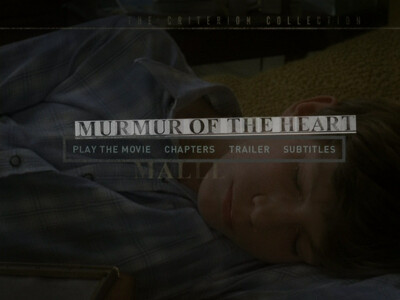
Murmur of the Heart--it's a title both literal and metaphorical. Laurent Chevalier (Benoit Ferreux), the fifteen-year-old main character in Louis Malle's semi-autobiographical 1971 movie, has a an actual heart murmur, a health issue that at first derails his young life but then manages to put him on track for the third act of his teen years. At the same time, the idea of this palpitation means so much more. It's the flutter he feels in the blush of romance, the emotion he has for his mother, and an indication of mom's description of him as her sensitive child.
Set in 1954, Murmur of the Heart shows a Paris in the midst of social transformation. Still ahead of the protest and student revolution that was to come, there are inklings of change everywhere. Laurent and his friend start the movie walking the streets, collecting money for the Salvation Army to send to the wounded in Indochina. France's involvement there is already proving disastrous for them, and it's become a divisive issue. Socialist-minded youngsters take exception to the colonialist policies of the older generation. Granted, for a fifteen-year-old, such talk is probably as much of a precocious pose as it is a thoroughly considered conviction, but Laurent is intellectually adventurous for his age. He loves avant-garde jazz enough to shoplift the latest Charlie Parker (his exasperated declaration that “It's not dance music!” is a particularly well-observed moment of adolescent misfitry), and he voraciously reads everything from Camus to Story of O
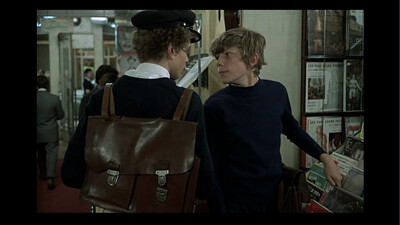
Benoit Ferreux is a marvelous discovery. I imagine Louis Malle had his own little heart flip when the boy crossed his path. The young actor is a gawky teen himself, his arms too long and his shoulders hunched, his teeth growing too big for his otherwise cute face; he doesn't have to fake the physicality. He's in that totally awkward stage where he's clumsy in both movement and in personal interactions. He's impulsively emotional, and not nearly as funny as he thinks he is. Laurent is also an observer, and Malle regularly inserts shots of the boy just watching, blank faced, not sure whether to go with the flow or throw a tantrum. We will see him do both.
Laurent is in a perpetual in-between state, a kind of limbo. His two goony older brothers, Marc (Marc Winocourt) and Thomas (Fabien Ferreux), are obnoxious cretins who think they have the world figured out and go about trying to have their way with it. In a way, Laurent wants to be just like them. It's only his sensitivity and his smarts that get in his way. For instance, he doesn't understand yet why you would kiss with your tongue, and when the older boys take him to a brothel so he can lose his virginity, he is reluctant. The prank they play on him makes the divide more obvious, even if it's not pointed out. This contrasts with the very next scene where, on a camping trip with the French equivalent of the boy scouts, Laurent portrays a caring father in a minimalist production of a Goethe play. The temptations the play details are calling him in real life, and Malle seems to suggest that it's up to him to protect himself the way he protects the young boy playing his son. No one else is going to do it.
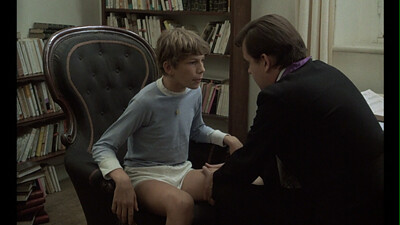
I'm tempted to call the world of Murmur of the Heart a hyper-sexualized one, but really, I think it goes beyond that. All earthly passions are ignited--art, food, drink, smoking, sex--Laurent is tasting them all for the first time. Even politics and religion, though the former is less immediate for him and the latter something he is beginning to reject. They are more adult topics, and his relationship with adults is strained. The priest who looks after him at school, Father Henri (Michael Lonsdale), is not trustworthy. He demands Laurent confess his sins, but halts the confession to make overtures at molesting the boy. Another priest uses mass to praise the war efforts and encourage his students to serve, a clash of ideals that seems out of place in a progressive world.
Laurent's relationship with his biological father (Daniel Gelin) is not very good, either. The boy has no real affection for the old man, probably because he sees him as someone who lacks passion, who may claim to enjoy the finer things in life but talks of them in ways that sound false and ignorant (not being able to identify a forged painting, for instance). Charles Chevalier is a gynecologist, reducing the holy of holies, a woman's private area, to something to be poked, prodded, and studied, but not loved. Laurent can't believe his dad ever rode a bicycle, nor does it make sense that this boring guy would have any kind of real relationship with Laurent's mother.
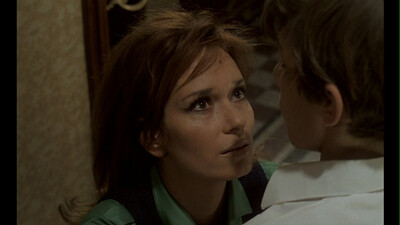
Oh, Laurent's mother! Clara is one of the greatest screen mothers of all time. As played by the beautiful Lea Massari, she is an older woman who has maintained her looks and an appetite to go with them. An Italian immigrant who fled Florence when her father got in trouble with the fascists, she ended up with Charles more out of convenience than any great desire. He won her hand simply by breaking through the language barrier. She is kind of the cliché Italian mother, overly protective and overly affectionate to her baby. She dotes on Laurent, spoiling him and covering him in kisses. He likes it, too, even taking her side against his brothers. In one scene, after Laurent's illness is discovered and he has to study at home, Father Henri witnesses her behavior and suggests that she treat her son like an adult, a notion she laughs off. Little does she know how essential this will be.
The discovery of Laurent's heart murmur is also connected to, and possibly even brought on by, the moment where his image of his mother starts to lose some of its illusory luster. The boy witnesses Clara getting in the car of another man, and it's obvious he is her lover. Here he throws one of his tantrums, tearing up her clothes. It's a childish reaction, but given what we see of how older men behave when competing for Clara's attention, male jealousy is always childish. Laurent's conflicted feelings about his mother's sex life are all tangled up in his own emergent sexuality. Malle is drawing a delicate line between all these various confusions--pedophilic priests, distant dads, mothering whores, and whoring mothers. Should Laurent gallantly defend his mother or rebuke her?
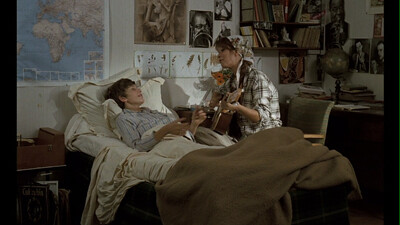
The two leave Paris for a country spa where Laurent is to receive a treatment for his heart condition, and it ends up being where he is cured of his childish notions and starts to step toward manhood, as well. The mini-vacation has shades of a lover's getaway, with mother and son alone to indulge their mutual adoration. Laurent is both the jealous son who is realizing that his mother is admired by the rest of the world in ways not as pure as his own admiration and the jealous lover who realizes he is just as dirty as everyone else. A cocky young boy (Francois Werner), who also happens to be a royalist (gasp!), makes no bones about his intentions with Clara, and later, her secret lover also comes and sweeps the woman away, only to break her heart.
Amidst this, and amidst his own realization that girls his age are beginning to notice him, Laurent must come to grips with his own image of women and how his mother's place in his life has informed it. Malle has concocted a couple of potent yet potentially scandalous scenarios for this. When Clara is in the room, Laurent spies on her in the bath; when she is gone, he is left alone with her underthings. He builds an effigy of her, starting with panties and bra and building up from there. He even wears her dress and her make-up, a roleplay foreshadowed earlier when his brother Marc dresses as Clara to tease him. What must it be like to be her? Is she more than just the woman who gave him birth?
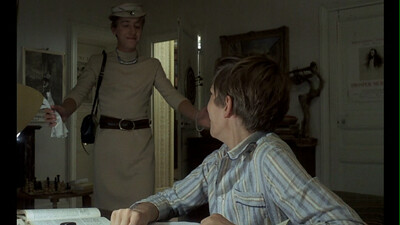
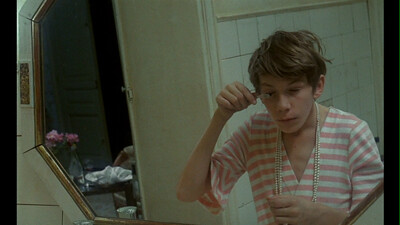
Surprisingly, yes, Clara is humanized by this drag act. When she returns, Laurent becomes her confidante. Though they always spoke candidly, there was a familial barrier between them. Now they speak as friends, with Laurent not even questioning that his mother has a lover. He also becomes her protector, escorting her from drunken soldiers, and she accepts his position as such, herself growing past her early frustrations over his objections to Hubert, the boy at the spa. The intimate scenes that follow could easily be mischaracterized, but a sensitive viewing of what passes between them reveals that it is not really sexual, but something more of a rite of passage, of the mother ushering her son into manhood by removing the mystery that has so enraptured him. It finalizes the lesson that she, too, is a woman like any other and should not be his be all and end all. The fact that Laurent immediately goes out and asserts his newfound manhood shows that the hold has been broken. It's one of those situations where, by lifting the taboo, the parent has made the allure the child has for the forbidden object take on a more realistic proportion.
All of this is conveyed with Malle's usual commanding yet unpretentious storytelling. The more I see of his movies, the more humanist his point of view strikes me as being. Murmur of the Heart treads territory that could be salacious or troublesome, but he handles all of it with a light, careful touch. Any sex is framed tightly, focusing on faces rather than bodies, reminding us that it's not about the physical details but the exchange of experience and emotion. He and cinematographer Ricardo Aronovich keep the lighting low and the colors neurtral so as not to overly dramatize or sensationalize. In a way, the atmosphere is cold in the city, much darker hues, more browns and beiges, and the environment becomes warm and natural in the country, the film blossoming with Laurent. Simultaneously, the director treats Clara with tenderness once he has gotten her out of the Chevalier home, making her more real, taking away some of her make-up and her fancier clothes (she is brighter, more green, a splash of pizzazz back in the city), and revealing her as the mature and, really, down-to-earth woman she is, not the urban housewife she plays for everyone else.
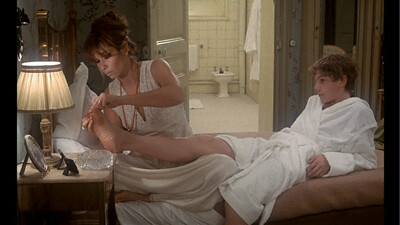
As coming-of-age tales go, Murmur of the Heart is uniquely frank and, like Louis Malle's Au revoir les enfants, uniquely the writer/director's own. Though we might be able to say individual scenes are like other movies about young boys getting lost in a morally confusing landscape and finding their way to the other side, none are really quite the same. Both films could have easily been remade as more sensational, sentimental, grandiose, and generic Hollywood pictures, but thankfully, so far no one has tried. Some might say that the subject matter is just too hot to handle, but I like to think it's Malle's insightful writing that really makes it too daunting for the big machine to tackle. Such personal expression exposes anything less personal for being false just by standing so true.
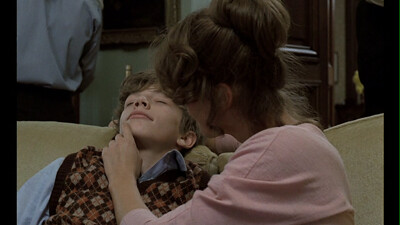

1 comment:
It’s Dijon, not Paris
Post a Comment